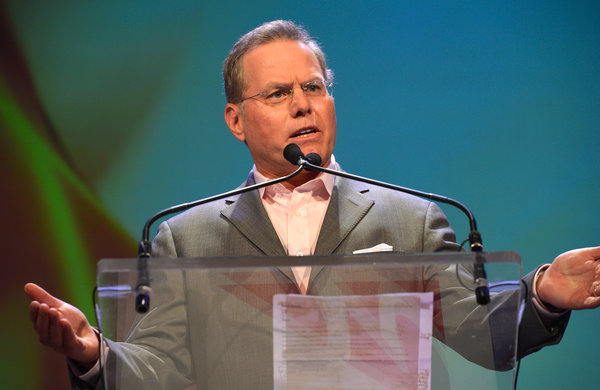AT&T and Discovery Merge Media Assets Forming TV Giant
Discovery's David Zaslav to helm combination with WarnerMedia

The smarter way to stay on top of broadcasting and cable industry. Sign up below
You are now subscribed
Your newsletter sign-up was successful
AT&T and Discovery Communications said they reached a definitive agreement to combine AT&T’s WarnerMedia with Discovery, creating what they called a TV and streaming giant.
AT&T, which bought Time Warner three years ago for $85 billion, will receive $43 billion worth of cash and debt. Its shareholders will own 71% of the new company. The deal would unwind AT&T's strategy of combining its mobile phone and broadband assets with a content company.
AT&T also agreed to spin off DirecTV, another expensive media acquisition, in March.
Discovery’s CEO David Zaslav, who has been touting Discovery’s unique place in the media world, will be the head of the combined company, which will own streaming assets in HBO Max and Discovery Plus and a collection of cable networks, including the former Turner networks' news channel, CNN, general entertainment and sports channels TBS and TNT, and kids programmer Cartoon Network as well Discovery’s unscripted channels HGTV, Food Network, Discovery, TLC and OWN.
Also Read: David Zaslav Says Name of New Company Coming
The combined company is projected to have 2023 revenue of $52 billion and adjusted earnings before interest, taxes, depreciation and amortization of $14 billion.
The combination of the two companies is expected to result in $3 billion cost synergies annually.
The smarter way to stay on top of broadcasting and cable industry. Sign up below
They spend a total of $20 billion on content, more than Netflix, which plans to spend $17 billion this year.
“This agreement unites two entertainment leaders with complementary content strengths and positions the new company to be one of the leading global direct-to-consumer streaming platforms. It will support the fantastic growth and international launch of HBO Max with Discovery’s global footprint and create efficiencies which can be re-invested in producing more great content to give consumers what they want,” said John Stankey, AT&T’s CEO.
“For AT&T shareholders, this is an opportunity to unlock value and be one of the best capitalized broadband companies, focused on investing in 5G and fiber to meet substantial, long-term demand for connectivity. AT&T shareholders will retain their stake in our leading communications company that comes with an attractive dividend. Plus, they will get a stake in the new company, a global media leader that can build one of the top streaming platforms in the world,” Stankey said.
"During my many conversations with John, we always come back to the same simple and powerful strategic principle: these assets are better and more valuable together. It is super exciting to combine such historic brands, world class journalism and iconic franchises under one roof and unlock so much value and opportunity,” said Zaslav.
“With a library of cherished IP, dynamite management teams and global expertise in every market in the world, we believe everyone wins...consumers with more diverse choices, talent and storytellers with more resources and compelling pathways to larger audiences, and shareholders with a globally scaled growth company committed to a strong balance sheet that is better positioned to compete with the world’s largest streamers,” Zaslav said. “We will build a new chapter together with the creative and talented WarnerMedia team and these incredible assets built on a nearly 100-year legacy of the most wonderful storytelling in the world. That will be our singular mission: to focus on telling the most amazing stories and have a ton of fun doing it.”
The new company would aim to take on the leaders in the new streaming TV market, now led by Netflix and The Walt Disney Co.
“We think this merger idea would be an explicit acknowledgement that neither company believes it can succeed in the streaming future alone,” said Todd Juenger, analyst at Sanford C. Bernstein. “We don't blame them for doing something, collecting some synergies, giving themselves more options. It's better than doing nothing. But whether this idea is ‘better than nothing’ is not the operative question."
Juenger said he’s looking at the deal from a skeptical point of view.
“Taking two businesses where the vast majority of the cash flow is derived from linear TV, which is in our opinion a structurally impaired business (with cyclicality as well), does not create a better business,” he said.
“In terms of the future optionality created, it's not clear how the streaming offerings would be combined/packaged together, and how that creates a new product(s) which would lead to a consumer proposition that would attract more subs at higher ARPU at higher margin, for which the market would accordingly be expected to value at a higher PV than what is already embedded in the stocks.”
HBO Max is already one of the highest-priced streaming services. Discovery Plus is priced lower because Discovery features low-cost unscripted programming, which Zaslav said gave it a unique position in the industry and offered consumers a distinct value proposition.
Last month AT&T said it had 44.2 million HBO and HBO Max subscribers at the end of the first quarter.
Discovery most recently reported having 15 million direct to consumer subscribers at the end of the first quarter.
Jon has been business editor of Broadcasting+Cable since 2010. He focuses on revenue-generating activities, including advertising and distribution, as well as executive intrigue and merger and acquisition activity. Just about any story is fair game, if a dollar sign can make its way into the article. Before B+C, Jon covered the industry for TVWeek, Cable World, Electronic Media, Advertising Age and The New York Post. A native New Yorker, Jon is hiding in plain sight in the suburbs of Chicago.

